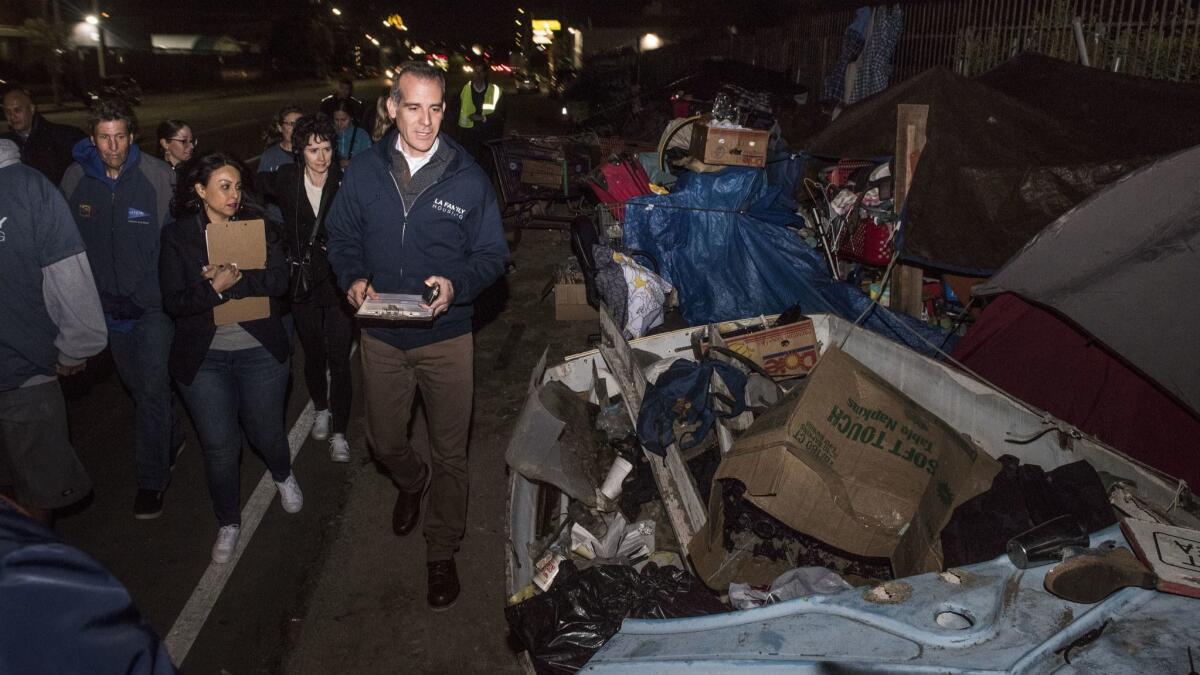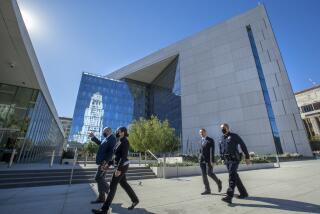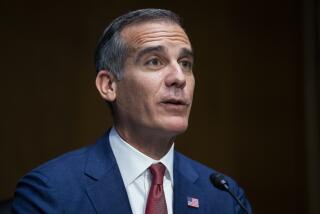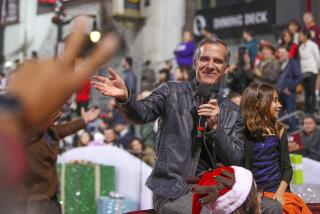With the national spotlight fading, Mayor Eric Garcetti turns to problems in L.A.

- Share via
For nearly two years, Los Angeles Mayor Eric Garcetti garnered national media attention with his travels around the country, including to key presidential primary states. In speeches, he labeled Washington as corrupt, inept and divisive — and he drew a contrast to L.A.
He said mayors are tackling issues, including climate change and transportation.
“Solving real problems,” he told a crowd in Minnesota last fall, “that’s what we do in the real world.”
Taking his own advice, Garcetti announced at a hastily-called news conference Tuesday that he’d “finish the job” of being Los Angeles mayor, rather than launch an expensive and time-consuming 2020 challenge to President Trump.
But Garcetti faces a new and complex set of issues at home that will test his “mayors get things done” mantra. He also must deal with a changing City Council, with several seats up for election next year.
Homelessness remains the most immediate problem for Garcetti, and there are questions about the rising costs of the shelters and affordable housing meant to ease the crisis.
At the same time, gentrification has made the mayor a target of left-wing activists, as has the frequent arrests of homeless people. Hecklers blocked him from giving a speech last month at USC.
Relations between police and L.A.’s African-American community are also under scrutiny following a Times report showing that Los Angeles Police Department’s Metro officers stop black drivers at a rate of more than five times their share of the population.
Meanwhile, an FBI investigation of possible bribery, extortion and money laundering at City Hall is raising questions about the influence of developers. Two Garcetti appointees were named in a search warrant seeking email and other records. Authorities have not charged anyone with a crime, and no one has accused the mayor of wrongdoing.
Jessica Levinson, political law professor at Loyola Law School, said there could be political fallout for Garcetti from the FBI probe, but homelessness is the far bigger issue.
“Homelessness and trying to solve homelessness will be his legacy when we think about Eric Garcetti,” she said.
Advocates for homeless people have praised Garcetti’s plan to build shelters and permanent supportive housing. At the same time, the price tag of his signature shelter program is being readjusted beyond his initial allocation of about $1.3 million per shelter, with planned structures in Venice and South L.A. running about $5 million each. Those figures also don’t include operating costs.
Separately, construction costs to build permanent supportive housing using money from the voter-backed initiative Proposition HHH are rising.
On Tuesday, Garcetti brought up the homelessness crisis and said he could “absolutely” end it sooner if he were president. But he also said, “the city deserved my attention.”
The mayor’s travels will continue, though. He’s scheduled to be in Washington next week to testify on infrastructure at a congressional hearing.
Also, when asked about it at Tuesday’s news conference, he declined to commit to serving out his full term, which runs until 2022.
Jed Parriott, an organizer with the local chapter of the Democratic Socialists of America, said he was frustrated watching Garcetti’s trips across the country as local activists were campaigning for Proposition 10, a ballot measure that would have allowed cities to expand rent control. Voters rejected it in November.
Now, he said, the mayor has a new chance to show he cares about homelessness and the housing crisis squeezing Los Angeles. So far, “it’s been all show, no substance,” Parriott said. “Let’s see housing get built. Let’s see people move in. Let’s see people getting treated differently on the street.”
Garcetti has plenty of work to do in L.A. on a wide range of issues, said Sean Meredith, a Los Feliz resident and an advocate for redesigning L.A. streets to make them safer. The mayor, he alleged, has “totally abandoned” Vision Zero, his 4-year-old directive to eliminate traffic deaths by 2025.
The mayor’s spokesman, Alex Comisar, said there’s been some progress towards Vision Zero’s goals, including a 26.6 percent decrease in vehicle-on-vehicle fatalities since 2016.
Garcetti also faces pressure from a growing consortium of left-wing groups. Melina Abdullah, co-founder of the Black Lives Matter chapter in Los Angeles, said that Garcetti needs to go beyond a “political answer” to concerns about the report that police are disproportionately pulling over black drivers.
Garcetti this week called for an audit of the stops. The mayor also told reporters that the Office of Inspector General was already working on a review.
“That was kind of disingenuous because he knows that an audit is already under way ... and an audit doesn’t change policy,” Abdullah said.
She argued that the city needs to shift funds away from the police department and into other community services, such as workers who assist youths and mentally ill people. And the city needs to provide affordable housing to stop the out-migration of black residents to faraway cities, such as Palmdale and Lancaster, she said.
On Tuesday, the mayor touted his work bringing the 2028 Olympics to L.A., addressing climate change and raising the minimum wage.
He worked closely with City Council President Herb Wesson on many of those issues and has a reliable relationship with the 15-member body. But Wesson is termed out next year and it’s unclear who will lead the council.
Times staff writers Michael Finnegan, Emily Alpert Reyes and David Zahniser contributed to this report.
Twitter: @dakotacdsmith
More to Read
Sign up for Essential California
The most important California stories and recommendations in your inbox every morning.
You may occasionally receive promotional content from the Los Angeles Times.











